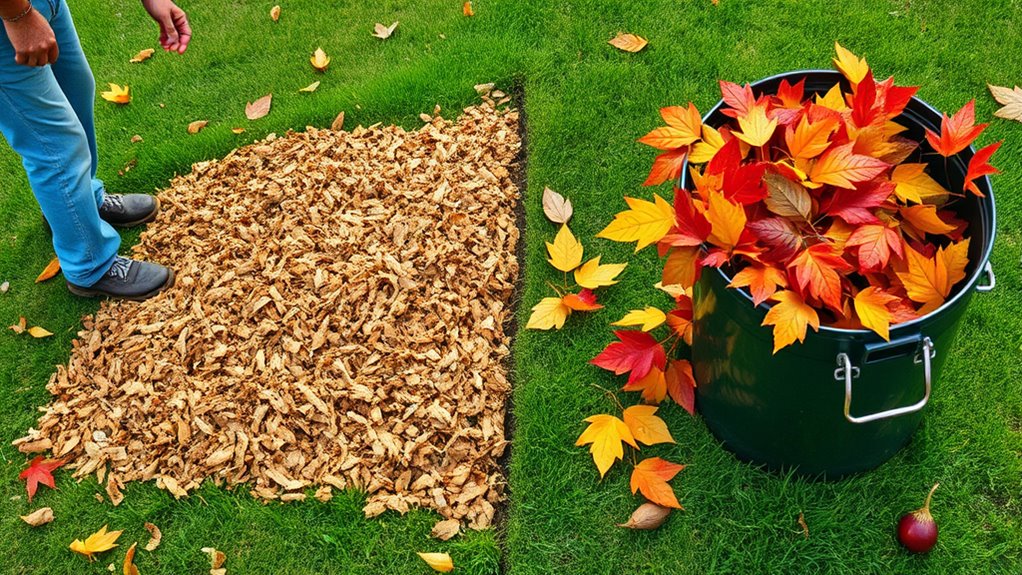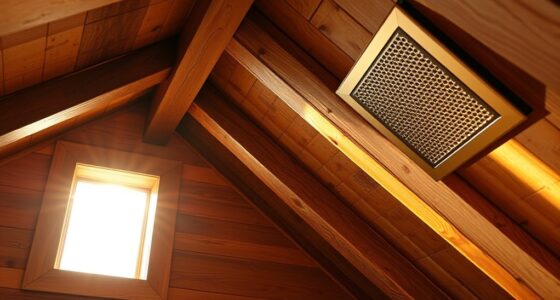Mulching leaves is better for your garden and the environment because it enriches the soil, retains moisture, and suppresses weeds, making your yard healthier and more sustainable. Bagging leaves offers quick and tidy cleanup but removes valuable organic material and increases waste. If you want to boost soil health and reduce waste, mulching is the way to go. To discover which method fits your needs best and how to do it effectively, keep exploring options.
Key Takeaways
- Mulching leaves enriches soil and promotes eco-friendly composting, while bagging offers quick, tidy cleanup with less environmental benefit.
- Mulching supports soil health, moisture retention, and weed suppression; bagging removes organic material, reducing soil benefits.
- Mulching reduces yard waste, encourages sustainability, and recycles nutrients naturally, unlike bagging, which increases waste.
- Bagging is ideal for immediate cleanup and convenience, whereas mulching requires more time but benefits long-term garden health.
- Choosing between them depends on whether prioritizing environmental sustainability or quick, easy yard maintenance.

When deciding how to handle fallen leaves, you have two main options: mulching or bagging. Both methods influence your garden cleanup and the health of your yard, but mulching offers notable advantages if you’re interested in sustainable practices like leaf composting. Bagging, on the other hand, is quicker and more straightforward but may not provide the same benefits for your soil.
If you choose mulching, you’re fundamentally turning leaves into a valuable resource. Using a mulching mower, you can chop leaves into tiny pieces that settle on your lawn or flower beds. These shredded leaves decompose over time, enriching the soil with organic matter and nutrients. This process supports leaf composting efforts, allowing you to recycle yard waste into a natural fertilizer. Mulching also reduces the amount of debris you need to bag and dispose of, making your garden cleanup more efficient and eco-friendly. It suppresses weeds, retains soil moisture, and prevents soil erosion, creating a healthier environment for your plants. Plus, mulched leaves act as a natural mulch layer that cools the soil during hot weather and insulates roots during cold snaps. Mulching benefits can also include improved soil aeration and microbial activity, further enhancing your garden’s vitality.
Bagging leaves might seem easier at first, especially if you’re pressed for time or prefer a tidy yard. It involves raking or blowing leaves into bags, then hauling them away for disposal or composting outside your property. While bagging provides immediate cleanliness, it removes a significant source of organic material that could otherwise be reused or composted. If you opt for bagging, you might consider saving some of the leaves for your compost pile or community compost program, but it generally doesn’t contribute directly to leaf composting on your property. Over time, this method can lead to more waste and less nutrient recycling within your garden, which isn’t ideal if you want a sustainable, low-maintenance landscape.
Frequently Asked Questions
How Does Mulching Affect Soil Health Long-Term?
Mulching leaves benefits soil health long-term by enhancing soil nutrient cycling and boosting microbial activity. As you mulch, organic matter breaks down gradually, enriching the soil with essential nutrients. This process encourages beneficial microbes that support healthy plant growth. Unlike bagging, mulching keeps nutrients in place and improves soil structure, leading to more resilient soil over time. You’ll notice healthier plants and better soil vitality as a result.
Can Bagging Leaves Prevent Lawn Diseases?
Did you know that bagging leaves can help prevent lawn diseases by removing excess moisture and pathogens? While it might seem like a simple task, bagging can reduce leaf decomposition, which, if left on the ground, might harbor fungal or bacterial issues. Plus, bagged leaves can be composted later, offering composting benefits that improve soil health. So, bagging is a smart move to keep your lawn healthier and disease-free.
What Equipment Is Best for Efficient Mulching?
You should use a mulching mower with a high-quality blade for efficient leaf mulching. This equipment shreds leaves into fine pieces, ideal for leaf composting and enhancing your lawn’s health. Focus on effective mulching techniques, such as overlapping passes and maintaining a slightly dull blade for better shredding. Regularly bag and compost the mulched leaves to enrich soil, ensuring your yard stays healthy and vibrant.
Are There Specific Leaf Types Better for Mulching?
Some leaves are like gold for your mulch, breaking down quickly to enrich your soil, while others linger longer, affecting decomposition. Oak and maple leaves are ideal because they decompose fast and boost mulch quality. Avoid glossy or thick leaves like magnolia, which resist breakdown. By choosing the right leaves, you’ll create nutrient-rich mulch that nourishes your garden and improves soil health, making your yard a lush paradise.
How Do Mulching and Bagging Impact Local Wildlife?
Mulching leaves benefits local wildlife by minimizing habitat disruption, as it leaves natural cover and food sources intact. Bagging leaves can disturb habitats and reduce habitat preservation, making it harder for insects, birds, and small mammals to thrive. By mulching, you support a healthier ecosystem, providing shelter and nutrients, while bagging may remove these essential resources, impacting wildlife negatively. Choose mulching to promote a balanced, wildlife-friendly environment.
Conclusion
Ultimately, choosing between mulching leaves and bagging depends on your yard’s needs. Mulching can reduce waste by up to 30%, enriching your soil naturally, while bagging keeps things tidy. Did you know that mulched leaves decompose within a few months, boosting soil health? So, if you want a sustainable, eco-friendly approach, mulching is your best bet. It’s a simple way to save time and support your garden’s growth—all while helping the environment.









